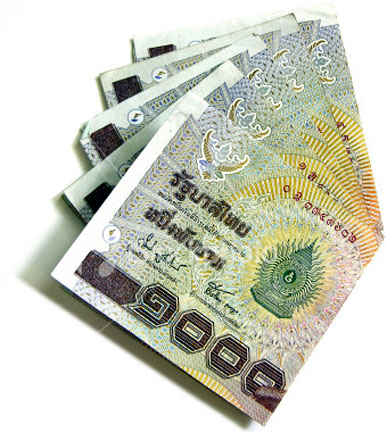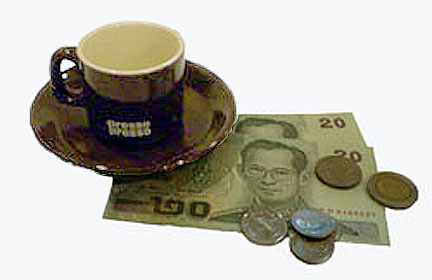*Unless you are an Expat;
Unless you are an American;
Unless you are a fellow SE Asian;
and, it isn’t Tuesday . . .
Yup, when it comes to tipping in Thailand, there are no hard and fast rules. Some say it never hurts to leave a bit extra, after all it really is such a small amount of money. Others that you are a fool for doing so; that you are helping to make tipping in Thailand mandatory instead of being a reward to the point where soon, like in America, you’ll be expected to tip the damn barista at Starbucks (and WTF is with that!). What you decide is appropriate will be what you feel most comfortable with, but here are a few, um, tips:
Thais do not tip. It’s not part of their culture. But enough Westeners have visited the Kingdom to have clued the Thai people into this golden opportunity for getting a few more baht out of farang. Farang, on the other hand, are use to tipping and feel as though we’re being a cheapskate if we don’t. Especially Americans; we’ve been bred to over-trip. Even for crappy service. In the middle of that ‘do, don’t, and what in the hell are you doing’ scenario, the Thais have carved out their own little niche making tipping in Thailand a, well, Thai experience.
The Thai translation for tip is ‘service charge’. It is added to your check at many restaurants in Thailand, a practice that is becoming more and more frequent. A service charge is also added to your nightly room rate at all hotels in the Kingdom. Technically, the service charge is your tip. A mandatory one. Tipping on top of this tip doesn’t make much sense. Usually. But then, this is Thailand.
In both the hotel and restaurant worlds where service charges are imposed, that money is suppose to be divided among the staff. But it first passes through the hands of management. How much trickles down is questionable. Employees of the Dusit chain of hotels went out on strike a few year ago over this very issue feeling they were being short changed. A reputable business owner will see that all service charge fees go to the staff. A less honest boss may keep the entire fund for himself.
Like service charge funds, tips left at bars and nightclubs are thrown into a pot to be divided among the workers at the end of the night (with management once again deciding if, and how much). So the tip you leave in the wallet after paying your tab does not go directly to your server, but rather into the tip pool. This is a system routinely used at American restaurants and bars, too.
If you want to tip above and beyond the service charge, and/or want your tip to go directly to your server, you need to hand your gratuity to that person directly. After settling your bill. And after handing back the wallet with any tip you may have left for the staff. Then, put your tip directly into that person’s hand. Thais, if they tip at all, do this with an emphatic downward push of the cash into the receiver’s hand, a nonverbal, ‘This is for you.’ They then get to keep what you gave them for themselves.
Here is a list of tipping guidelines for specific industries:
TAXI: It’s polite, but unnecessary to tip a taxi driver who uses his meter. It is, however, customary to give a small tip. Generally, tipping up to the next 5 or 10 baht coin is perfectly acceptable. I always did until I just started passing my cash over to my friend Noom and let him deal with it. Noom never tips taxi drivers. In fact, if the meter read sixty-one baht, for example, he’ll pay the driver 60 baht and consider it a done deal. With no objection from the driver.
If you agreed to a flat rate, you already are paying an inflated amount so no tip is necessary. Same same with Tuk Tuks, you’ve already negotiated (hopefully) with the driver. A tip is unnecessary and should not be given . . . especially if asked for!
TOUR GUIDES: Couldn’t help yourself and signed up for a day’s bus tour to a commercialized touri spot? 300 to 500 baht is the norm for tipping the tour guide, part of that will be passed onto the driver.
RESTAURANTS: First you need to check and see if a service charge (10%) has already been added to your bill. If not, four and five star establishments will accept a 15-20% tip as a matter of course. They are used to rich stupid farang. Leave 20% in the wallet at a two star joint and the waiter will probably keep bringing you back your change. If you have to leave a percentage because it’s comfortable for you to do so, 10% is about right. But on say a $20 dinner bill, whatever change comes in coins is perfectly acceptable as a tip. You’ll get the same exact wai as you would if you left a few dollars.
CLUBS. As with restaurants, tipping waiters, waitresses, and bartenders at a club means whatever you leave goes to the house. If you want the gratuity to go to a specific person, hand it to them. Typically gratuities for bartenders: 40 baht, and 20-40 baht per round for wait staff.
If you were on the receiving end of one of those infamous ‘shoulder rubs while peeing’ massages at the restroom in a club, a 20 baht tip is the norm. Please wash your hands before passing over the gratuity.
HOTELS. All hotels in Thailand add a 10% service charge to your nightly rate. But some staff positions are used to getting tips. How much depends somewhat on the quality of the hotel. Bell hops generally get 20 to 50 baht per bag. I always tip 100 baht per bag. Because I’m American. (kidding). I tip big to the bell hop because I’ll use him for whatever I need throughout my stay. He’s my go-to guy. And after getting the largesse I hand over at check in, he’s more than willing to ensure I’m happy and well taken care of for the duration. For example, he’s the guy I’ll ask to get me a cab, meter, for the airport. I never get burned with a fixed rate scam that way (and am too tired and ready for it to be over with to face the hassle otherwise.)
Tipping the housekeeping staff is an American custom. Nice, but totally unnecessary. I’ve usually bought a few pirated DVD’s during my stay, watched them , and having no need for them again pass them over to the housekeepers. They’re always thrilled to get those (uh, but not a good idea if you bought porn!) Five star hotel housekeepers are more familiar with being left a cash tip in the room. At a two or three star hotel, leaving some change in your room for the maid will almost guarantee it still be sitting there when you get back to your room later in the day. Leave it at check out and someone will likely bring your ‘forgotten’ cash to you at the check out desk. Better to watch for your housekeeper during your stay and hand her some baht in person. 20 to 50 baht per day is the norm for those who do tip housekeepers.
MARKETS. More frequently these days after bartering hard with a street vendor, she’ll smile sweetly and say, “Tip?” Asking for a tip in Thailand is considered rude. Technically, she just dissed you. But she knows most Westeners will hand over a few more baht even if they just spent 20 minutes haggling her down by that amount. Don’t do it. Regardless of the pout on her face and claims of poverty, she’s making a profit at whatever amount she agreed to. End of story.
MASSAGE/SPA. Tipping 50 to 100 baht to the person giving you a massage is normal. Some massage places that are heavily used by touri expect a higher tip due to past experience where the unknowing visitor hands over 200 – 500 baht.
If you are getting a massage at a place that offers a ‘happy ending,’ that’s an entirely different type of tip. And an entirely different post.
Related Posts You Might Enjoy:






It’s becoming more and more common for restaurants in Bangkok not to hand the 10% tip over to the staff. In one of the city’s best Italian restaurants, the staff share precisely 1.5% whilst the greedy owner keeps 8.5%. Ask the staff or the management how the service charge is divided up? No-one will tell you. That’s one reason I tip directly to the staff in addition (if the service has been good).
Best tip guide to Thailand i have read!
Thank you Jim!
It is always a pleasure to hear from astute and intelligent folk.
the land of smile
No, I can’t speak English
I am proud to be Thai
I love cryptic comments, so thanks. I think.